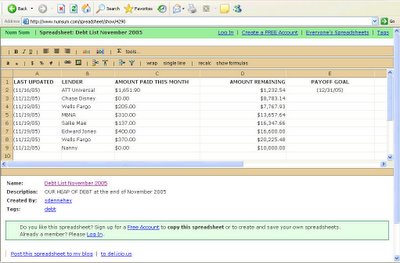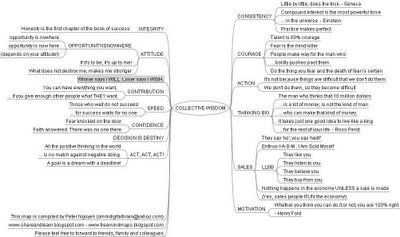There are 6+ million blogs on the Web. I subscribe to only one: Dave Pollard's. Here's something he wrote, which I found amazingly important, so I share it with you:
"This is what I do."
To be able to answer with that statement is, in a way, to know the meaning of one's life, and one's personal role in the world. We are hard wired, like every other creature on Earth, to strive to know what we're doing here, our purpose, the meaning of our existence, to instinctively figure out what we need to do to survive and how to do it well. What we do, how we make a living, is more than just a job, it's an essential part of the definition of who we are. This idea has been echoed by artists in different ways as long as we have existed. The TV program Millennium had as one of its tag lines "This is why we're here". The extraordinary Sheryl Crow song "We Do What We Can" reaffirms it. We all want to know our role, what we were uniquely born for. It is an essence of our psyche. We all want to say, knowingly, "This is what I do." -- I with a capital letter, bold.
In business the name for this dangerous concept is Distinctive Competency, which means the one specific thing you do better than anyone else. Most of us spend most of our lives looking for it, and many never find it, content to do an average, replaceable job, brainwashed by the political manipulators and economic elites into believing we're just commodities, like the products we're induced to buy. But we are not. We are all, every creature on Earth, special, unique, destined by the stars or by Darwin or by God or whatever guiding hand you choose to believe in, to do something utterly individual, inimitable, matchless, without compare. The butterfly fluttering its wings in South America not only precipitates the tidal wave in Japan by doing so, it was meant to do so. That's what it does.
We have forgotten all this, to our catastophic impoverishment and debasement. If we all realized that we have a distinctive competency, the consequences for our self-esteem, for our perceived value in the workplace, for the entire social and political and economic system, would be enormous, earth-shaking. It took me forty years to find mine.* We need to teach young people how to find theirs, more quickly and efficiently, to help them learn what is their true calling. We live in a world so connected that, having found our calling, what we do best, we could almost certainly find the market, and the people whose distinctive competencies are a perfect fit with ours, the people we are ideally suited, destined to make a living with. This is my vision for New Collaborative Enterprises.
And how liberating, how empowering, how uplifting it would be for every one of us to find and know what we do better than anyone else! Perhaps it's possible that it could bring such extraordinary meaning to each of us, to our lives, that it could be the catalyst for global peace and harmony, for an end to violence and hatred and envy and greed and inequity. Because what possible reason would there then be for us to fight among ourselves, or with nature's other creatures, if we knew that no one else could fill our role, our place, our destiny? That we have no competition for what we do best, and that others are no threat to us, or us to them. That we have a purpose, and nothing to prevent us from realizing it, fulfilling it. Is that so crazy?
Full posting
HERE.




